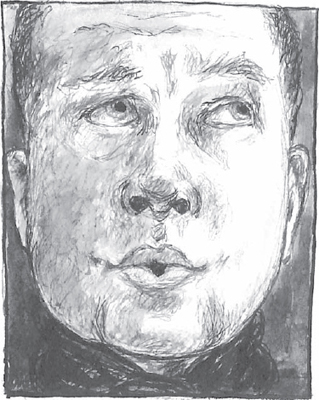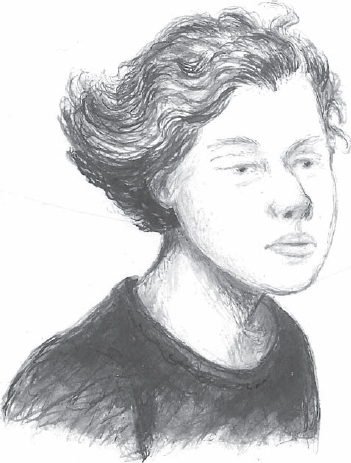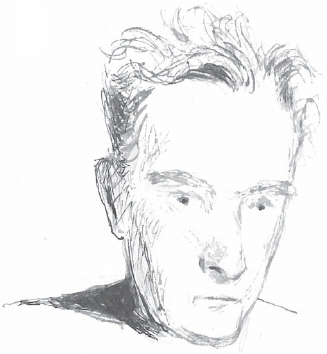Ordinary Sins (9 page)
Authors: Jim Heynen
Everyone had a secret, but most didn't know how to protect it. They were clumsy or reckless, like shoplifters who didn't notice the security cameras or who didn't know how not to look like a shoplifter. Other men who would like to urinate wherever they pleased made stupid mistakes, like standing with feet apart, with one hand in front and one hand on the hip. Keeping one's secret was not for fools. It required imagination and practice. Keeping one's secret was an art, or at least a highly developed craft.

When this young man confronted his wealthy parents about their drinking, they disowned him. For the first time in his life, he was poor. Out on the street.
My parents disowned me and I am impoverished, he announced. I have nowhere to sleep, nothing to eat, no money to buy clothing. I don't even have a car.
The poor rich young man didn't have poor friends, so he didn't have anyone to ask how to be poor. How did one get food stamps? And how did one get a job as a dishwasher or a janitor? How did one act unemployed when the only people he had ever known were the ones who did the employing?
The poor rich young man talked to the friends he did have. Do you know about the bus schedule? he asked. Will I be safe riding one downtown to look for a job?
Don't be silly, said his friend. You can use my car. And we have a spare room at our house that you may use whenever you need it.
News of the poor rich young man's dire situation became the topic of conversation at many cocktail parties.
Wasn't that brave of him to challenge his parents about their drinking? They really were having a problem with it.
I simply adore him for that, said another. His heart is so good. He meant so well for his parents.
The poor rich young man soon had more dinner invitations than he could accept. Everyone's spare room was open to him, as were their refrigerators and spare cars.
Here, take the keys to the Chevy. Here, take these house keys. You can come in our back door any time you need a placeâthe security alarm code is on this card. And here's a key to the tennis court.
One woman gave the poor rich young man spending money
for house-sitting her cats, another for walking her dog through the park. There were canaries to feed and aquariums to check. There were suits and trousers on their way to the Goodwill that could just as well be given to the young man. Everyone wanted a piece of his welfare. Everyone gave him a key to something.
The poor rich young man learned to live with his misfortune. The ring of keys that dangled from his belt grew so large that poor people on the street nodded in recognition of one of their own.
How many floors must he be sweeping to need so many keys? How many latrines must he be cleaning every day?
Poor people smiled at the young man as if he were a brother, as did the rich, thus giving the poor rich young man the best of both worlds as he made his way through this difficult time in his life.
It was not about the shoes so much as the shoelaces. If they were soap, he would have been lathering his hands with them. If they were water, his hands would have been surfing them. He was cleaning their floppy ears! He was orchestrating the shoelaces! The shoes were quite handsome, black wingtips with a real luster, but they were not major players in the drama. It was the shoelaces that excited him and must have satisfied something that others would not understand.
The abrupt quickness of his stooping suggested that he stooped to tie his shoes often. Did his mother not teach him to tie a shoe properly the first time?
Others on the sidewalk swerved around the bulging smile of his buttocks.
His efforts produced two impressive loops that hung down over his shoe like the floppy ears of a beagle.
When he started walking again, his face showed he was not happy with his freshly tied shoe. It may have been too tight, or he might have sensed that it was too loose and would again be two unbowed strands after a few steps. He walked over to a bench near the bus stop, sat down, and retied the same shoe.
This had to be about something more than shoestrings. He must have been trying to solve an invisible problem, perhaps mending a relationship that was unraveling.
He gritted his teeth as he looped and pulled the shoestrings, then gave both loops a final tug for good measure.
The man was in his fifties and should have worked through his problems by nowâor at least found a more conventional means of dealing with them, but he was not hurting anyone, and who was to say how a man should confront the anguishes of his life?
He stood up and was off again with his freshly tied shoe, but
he was looking down. Something was wrong, but now it was the other foot. He stooped to tie the other shoe, and he grappled especially hard to get it right. Admirably, the man had chosen today to confront all of his problems at once.
He had been an artist in his own right. Running programs and dispensing funds was now his way of making a modest living while staying close to what had always been dear to him.
Other artists loved him the way artists love people who have their hands on the purse strings. They told him how good it was to work with somebody who understood an artist's problems.
Most people just don't know what it's like to deal with greedy gallery owners. Most people have no idea how hard it is to make a living writing unpopular literature. You have a heart, man, you really do.
The arts administrator worked hard at convincing legislators and philanthropists to donate money to the funds he managed. He practiced sales pitches on his friends who were not artists. He noted how business people dressed. He learned to impress them by appearing to be impressed by them.
Among artists he dressed more casually, though he tried to emulate some of the mannerisms of those who provided him with the funds he dispersed. Sometimes the funders felt like his parents and the artists like his children. The funders needed praise; the artists needed nurturing. Flipping from praise to nurturing became an art in itself, and he became a master at it.
At night he went home to his stylish apartment. For half an hour he played the piano to relax. Then he took out his notebook, sat at his small desk overlooking the courtyard below, and wrote a few lines of poetry. After cocktails with a few friends, he went to his painting closet and worked on his unfinished watercolors. Then he prepared a light gourmet dinner, sat down at the table alone, and between bites, wrote a few notes in his journal. Sometimes before going to bed he stood in front of the mirror with one of his own paintings, held it up toward the mirror, and imagined himself to be a curious and objective observer.
When the book reviewer finally wrote her own book, she imagined what other book reviewers would say.
Her book was a strange and quirky collection of short prose pieces that she hoped reviewers would label “flash fiction,” though she knew some might call them prose poems, which would be all right with her. If anyone labeled them “snippets” or “vignettes,” she would throw an epic tantrum.

A rainbow of earthly delights was what she hoped
Publisher's Weekly
would say.
But what if
Kirkus
said, If no one wished Milton's
Paradise Lost
to be longer, no one will wish these anorexic snippets to be shorter?
What if
The New York Times Book Review
wrote, If the author took any pains to write these weightless vignettes, they certainly were not labor pains?
Would
Library Journal
say, Perhaps readers are witnessing the invention of a new literary form: it should be called
Farts in the Wind
?
Still, she could see a respectable academic journal declaring, This collection is a banquet of delectable hors d'oeuvres, each with its own flavor so distinct that it needs no garnish. Something for every palate!
There simply was no way of knowing what reviewers would say. That was the torment. What if one of them was someone whose work she had reviewed harshly? But, no, she had never been gratuitously harsh, only painstakingly honest. At any rate, it was all a matter of taste, anyhow.
I don't really care what they say about me, she finally consoled herself, so long as they're talking about me.
This man wanted to be anonymous. He wanted to be as inconspicuous as a flyspeck on a black car, but the world conspired against him. One day he received twenty e-mail advertisements, six telemarketing calls, and a piece of junk mail from an insurance company that began with the words WE LOVE YOU! The same day, when he bought a new pair of walking shoes with cash, the sales clerk asked, Could I have your zip code, please?
This is driving me crazy! he shouted. I do not want to be identified by name, by address, by telephone number, by Social Security number, or serial number. I do not want to be known by zip code, by area code, by color code, or by secret code! Enough is enough!

He started erasing himself by changing his legal name to John Doe.
A person to whom he wrote a check was the first to talk: The first odd thing about him is his name, but then just watch him. He's like a deer foraging in a forest; every few seconds he lifts his head and looks quickly in both directions.
Word of John Doe's pursuit of anonymity spread like a flu virus quietly and inconspicuously around the town. It wasn't long before a stranger on the street walked up to him and said, You're John Doe, aren't you?
It was time to mutate once more: he researched the most common names on earth and changed his name to Muhammad Smith.
It evidently was a curious combination and soon, someone pointed at him and said his name as if it were a delightful curiosity that everyone should enjoy.
Anonymity will have to start at home, he finally realized. If I stay in my house, I will become invisible to the world. But what to do with himself alone in his house? The answer was obvious once he picked up his pen and started writing. Of course! Writing! Why hadn't he thought of this before?
Anonymously, Muhammad Smith wrote and wrote poems and short stories, wrote and wrote until he became curious about what others might think of his writing. He sent off samples. Editors loved his short stories. Editors loved his poetry. He published in magazines and newspapers all over the country. Hundreds of publications that he kept in boxes around his house. To his amazement and deep satisfaction, within three years, no one recognized his name or knew who he was.